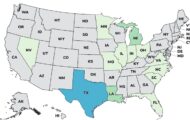The USDA’s Food Safety and Inspection Service (FSIS) has released its summary of FSIS foodborne illness outbreaks for fiscal year 2019 that involved FSIS-regulated products. The four pathogens that most often affect those products are Salmonella, Shiga toxin-producing E. coli (STEC), Listeria monocytogenes, and Campylobacter.

During fiscal year 2019, FSIS investigated 16 outbreaks that sickened about 1000 people and hospitalized more than 175 patients. 94% of these outbreaks involved illnesses in more than one state.
Salmonella was the most common pathogen in these outbreaks, followed by STEC, and Listeria monocytogenes. Beef and chicken were the most common food products of interest. Salmonella serotypes in these outbreaks included Blockley, Enteritidis, Newport, Rissen, and Schwarzengrund. The E. coli outbreaks were caused by O157:H7, O26, O103, and O121. Three of these outbreaks involved a product recall.
FSIS conducts after-action reviews at the end of these foodborne outbreak investigations to try to identify lessons learned that can improve response and prevent more outbreaks. One after action review (AAR) was conducted after a Salmonella Schwarzengrund outbreak associated with ground turkey. In that outbreak, seven people in 3 states were sickened. One person was hospitalized.
The USDA found that there was a need to improve communication between partners. And a best practice was identified when public health partners notified FSIS about the outbreak early on using the FSIS outbreak notification email address. It’s crucial that government communicate early with industry and tell a firm when a potential association is identified between illness and the firm’s product.




